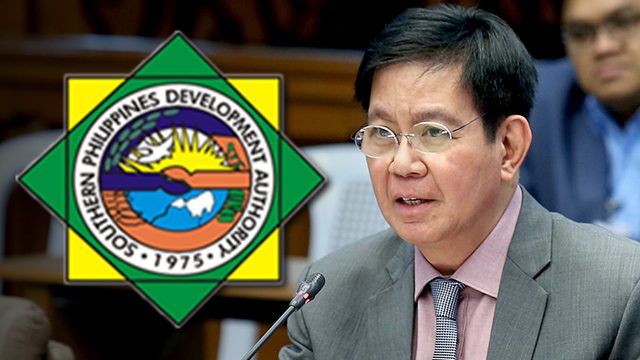SUMMARY
This is AI generated summarization, which may have errors. For context, always refer to the full article.

MANILA, Philippines – Senator Panfilo Lacson on Tuesday, September 27, questioned a Mindanao-based government-owned and -controlled corporation for consistently failing to earn revenue for the government.
In a Senate hearing on the proposed 2017 budget, Lacson criticized the Southern Philippines Development Authority (SPDA) for mismanaging its funds, making it an apparent burden to the national government.
“How long can government provide subsidy? Taon-taon lugi kayo (You lose money every year). What’s the reason for your existence? Kung sa private ‘yan, 5 taong lugi magsasara ‘yan (In the private sector, if a company incurs losses for 5 years, it would be shut down),” Lacson said.
The SPDA’s proposed 2017 budget is P41 million, slightly lower than this year’s P42 million.
The senator said the agency should earn money for the government and not just rely on subsidy.
A GOCC is any government agency or office that is mandated to operate public assets for profit and economic development.
“If you can convince us on your fiscal independence, in how many years? Dapat GOCC nagreremit sa national treasury, hindi taon-taon sinusuportahan ng national government, para tumulong sa revenue generation,” he said.
(A GOCC should remit to the national treasury so it can help in revenue generation, and not receive support from the national government every year.)
The SPDA was created by Presidential Decree Number 690 during the Marcos regime to engage in various development projects in conflict-torn areas.
Then President Gloria Macapagal-Arroyo reactivated the agency in 2006 through Executive Order 560, citing the 1996 peace pact between the Philippine government and the Moro National Liberation Front.
Chief Peace Adviser Jesus Dureza, for his part, suggested that the SPDA be put under the Office of the Presidential Adviser on the Peace Process.
The SPDA, Dureza said, could help OPAPP in implementing development projects through the Pamana program, should the President formally expand OPAPP’s mandate through an executive order.
“Now launching OPAPP to already implement projects, I suggest, and this is something I feel, that SPDA could be a tool in the implementation of our mandate. The SPDA in its old charter is very powerful,” Dureza said.
The suggestion sat well with Lacson, who said it might help the office to regain its fiscal independence, if still possible.
No contribution to national coffers
Lacson asked agency officials if they were ever able to remit money to the national coffers.
Datu Reza Sinsuat, acting corporate board secretary and head of the SPDA legal team, said the agency has so far not contributed to the treasury, following their reactivation in 2006.
“Sir, so far wala po (none). When SPDA was reactivated in 2006, we told the Department of Budget and Management that this is what is needed for the projects and we are committing we need 3 years to implement, that we will gain financial independence. Kaso retaso lang talaga binigay (Only scraps were given),” Sinsuat said.
To which, Lacson replied: “If I were the DBM secretary, ‘di ko kayo bibigyan ng 100 million, every year sinusubsidize kayo kung may net loss kayo. Never pa kayo nakaremit (I will not give you P100 million. Every year you’re subsidized and you incur a net loss. You’ve never remitted).”
Sinsuat then defended the agency, saying it is in a “unique” situation compared to other GOCCs. While GOCCs are required to earn and remit funds to the government, the SPDA is mandated to conduct “development efforts.”
“Medyo unique, inaallow development efforts. ‘Pag tiningnan mo social functions, nagiging incubator….May mga far-flung areas, wala gobyerno, pati private investors ‘di papasok kasi malulugi sila. SPDA ang papasok and ‘di malaki ang kita,” Sinsuat said.
(It’s kind of unique, it allows development efforts. If you look at the social functions, it becomes an incubator….In the far-flung areas, there is no government, even private investors will not come in because they will incur losses. SPDA will come in and the profits are not big.)
Lacson then urged the agency to show its worth and maximize the Duterte administration’s focus on developing Mindanao, where President Rodrigo Duterte hails from.
It was not the first time the agency was questioned in the Senate. In 2011, then Senate finance committee chairman Franklin Drilon said the SPDA is already overlapping with other agencies and has not brought progress to Mindanao.
Drilon then cited other government offices that are already involved in developing the island region – OPAPP, Department of Social Welfare and Development, Mindanao Development Authority, Autonomous Region in Muslim Mindanao, and the National Economic and Development Authority, among others. – Rappler.com
Add a comment
How does this make you feel?





There are no comments yet. Add your comment to start the conversation.